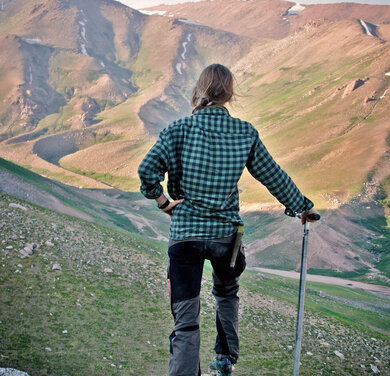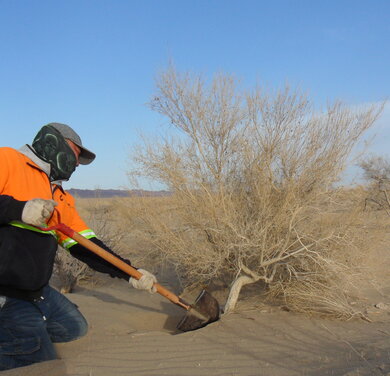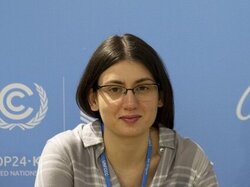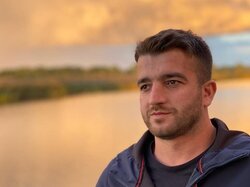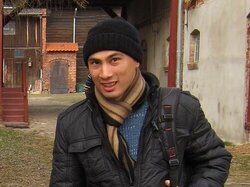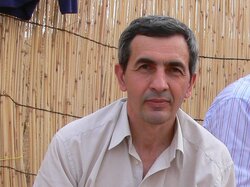Yury Bakur
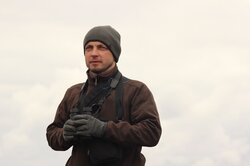
June 2025 and October until December 2025
Yury Bakur is a biologist from Belarus who has participated in numerous wildlife conservation projects in his home country. He spent twelve years conducting research in the deserts of Central Asia before his strong connection to his homeland brought him back.
Around the village where he was born lie three local nature reserves. Yury’s long-term goal is to unite these areas into a single national park. Despite melioration activities in the 1980s, the landscapes have largely retained their ecological integrity. They continue to provide important refuge for rare plants and animals such as the aquatic warbler, the greater spotted eagle, and various orchid species including lady’s slipper. The more he studies this region, the more confident he becomes that he is on the right path.
As part of the Eva Klein Scholarship, Yury is developing a scientifically grounded strategy for establishing a national park, drawing on international experience and expert recommendations from scientists at the University of Greifswald. During the scholarship period, he conducted fieldwork including detailed surveys of birds of prey and assessments of the aquatic warbler population. He is also working on the development of eco-trails and created a thematic video blog on Instagram to share insights into his research and the region.
Supervisors: Jens Wunderlich and Andrei Abramchuk
Yeva Danielyan
Yeva Danielyan, a PhD student at Yerevan State University's Faculty of Geography and Geology, is contributing significantly to environmental conservation in Armenia. With an MSc in Hydrometeorology and a B.S. in Geography from the same university, she has a strong academic foundation.
Since 2019, Yeva has worked in various capacities, including as a researcher on the "Pontos" project at the American University of Armenia and as a Senior Specialist at the Ministry of Environment of Armenia. Her diverse experience includes roles at Soluton LLC, Wigmore Group CJSC, and UNECE/FAO projects, focusing on sustainable forest management and environmental monitoring.
Currently, Yeva is serving as an project assistant at the Michael Succow Foundation on the "Capacity Development for the Establishment of the Dilijan Biosphere Reserve in Armenia" project. Her responsibilities include baseline data analysis and preparation of background information and maps for the biosphere reserve development, identification of information gaps and needed studies, contribution to the development of awareness raising materials, planning and facilitation of field trips, workshops, trainings and study tour and preparing relevant documents.
Supervisor: Nika Malazonia
Aibat Muzbay
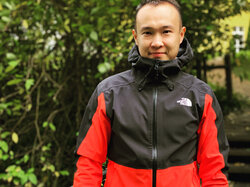
August 2023 to February 2024
Over the course of the five-month Eva-Kleinn-Fellowship programme, Aibat will engage in an analysis of the data amassed during his Master's program at Greifswald University. Insights regarding vegetation diversity, farmland distribution, and the behavior of saiga antelope in the Ural region hold profound significance in development of recommendations for decision-makers. Furthermore, the viewpoints held by local communities play a pivotal role in mitigating human-wildlife conflicts. By synergizing ecosystem with human activity and aspirations, the prospect of coexistence is fortified, ensuring the conservation of key species within the Kazakh steppe for the years ahead. The recommendations developed by Aibat through the Eva Klein program will constitute an integral component of his Master's Thesis within the Landscape Ecology and Nature Conservation study program.
Supervisor: Rustam Murzakhanov
Bulgan Odmaa
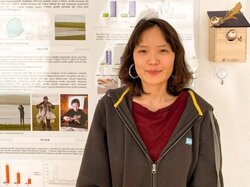
Project assistant for the project “Towards the World Heritage nomination of the Eastern Mongolian steppes
Bulgan Odmaa holds a Bachelor's degree in Geography from the National University of Mongolia and is pursuing a Master's degree with a thesis focused on White-naped Cranes. She has been working as a researcher at the Mongolian Bird Conservation Center NGO since 2021. In her previous role in Eastern Mongolian Protected areas administration as an expert in charge of the World Heritage and MAB sites in Eastern Mongolia, such as the landscapes of the Daurian World Heritage Site, the Dornod Mongol MAB Site, and the Tosonkhulstai MAB Site.
She was responsible for conducting research and management of these important protected areas. Her extensive experience in protected area management has earned her the Eva Kleinn Fellowship at the Michael Succow Foundation, where she is currently serving as an assistant on the "Towards the World Heritage Nomination of the Eastern Mongolian Steppes" project. Her main responsibilities include creating introductory materials, planning field trips, preparing documents for working group meetings, and facilitating communication among project team members to address any gaps.
Supervisor: Nika Malazonia
Uchrakhzaya Tserenbat
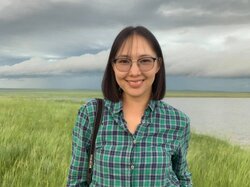
Project assistant for the project “Towards the World Heritage nomination of the Eastern Mongolian steppes
April to June 2022
Uchrakhzaya Tserenbat has a bachelor degree in Management of the Ecology and Environmental Protection of the University of the Humanities of Mongolia. She has been working as a researcher in Mongolian Bird Conservation Center NGO since 2019 and also the coordinator of Chukh Bird Research Station which is the only one station that focused on the shorebirds, especially their migration ecology. In recent years, she focused on wetland and steppe conservation projects in Eastern Mongolia.
Ms. Uchrakhzaya has experience on the planning and managing of the protected areas. During her two-months of the Eva Kleinn fellowship at the Michael Succow Foundation, Uchrakhzaya worked as an assistant in the project “Towards the World Heritage nomination of the Eastern Mongolian steppes” and developed introductory leaflets and planned further field trips. She also prepared required documents for further working group meetings of her project cooperating with colleagues. Her main duty was connecting team members and to focus on filling the gaps of their ongoing project.
Supervisor: Nika Malazonia
Irina Grigoryeva
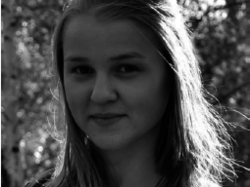
October 2021 to December 2022
Irina Grigoryeva is working for the Michael Succow Foundation in the field of nature tourism development in the Mangistau Oblast of Kazakhstan, which is funded by the Central Asian Desert Initiative (CADI) project and the International Climate Initiative (IKI).
Currently, Irina is studying Landscape Ecology in the master's program at the University of Greifswald. She also works in the Kazakh conservation organization "Association for the Conservation of Biodiversity of Kazakhstan" (ACBK), which is one of the NGO partners on the ground in the CADI project.
Pavlo Ardanov
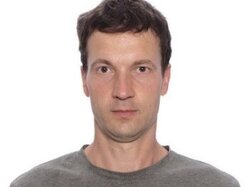
Dezember 2020 to April 2021
During his 5 months Eva Kleinn Fellowship with Michael Succow Foundation, Pavlo will be doing a research on designing crop polycultures (intercropping and crop rotation schemes) with vegetables and leafy greens) and will promote development of community-supported agriculture (CSA) in Ukraine. Pavlo is developing an integrated approach for designing crop polycultures based on optimizing diversity of crop traits and on multifunctional (of permaculture) system optimization based in crop integration within farm functional zones, management requirements, similar processing, resource needs and growth characteristics. The main project outputs are:
- Guidelines on intercropping and crop rotation schemes with vegetables and leafy greens for cold temperate climate, tailored for diversified small and medium producers, in particular for Community-supported agriculture (CSA) schemes.
- Academic publication with the review of successful crop polyculture practices and constrains among German CSA farmers.
- Recorded presentation from the CSA online seminar.
- CSA guideline translated into Ukrainian.
Supervisor: Sibylle Faust
Bektemir Osmonali
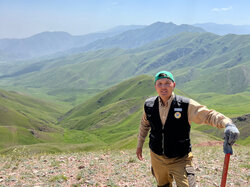
August 2019
Bektemir Osmonali was helping the Michael Succow Foundation to build one of the first digital herbaria in Kazakhstan as part of the International Climate Initiative's (IKI) Central Asian Desert Initiative project (CADI). See https://www.flora-kaz.de/
Bektemir is working at the Botanical Institute (Almaty) in Kazakhstan (www.botsad.kz). There he is working on his PhD thesis and is responsible for the further technical administration of the digital herbarium including the involvement and training of students and interns in working with the herbarium. In addition, he ensures the continuous updating of the technology.
Sarangerel Ichinkhorloo
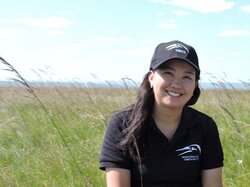
October 2019 until February 2020
Sarangerel Ichinkhorloo was involved in the World Heritage nomination of the Eastern Monogolian Steppes. She is an expert in bird and plant identification and was responsible for the organisation and administration of an expedition to the steppes. Until summer 2022, Sarangerel worked for a Mongolian conservation organisation (mbcc.mn). After that she founded her own conservation organisation, of which she is still the director. In the newly requested Mongolia project, the Michael Succow Foundation will cooperate with mbcc.
Gankhuyag Purev-Ochir
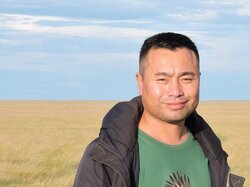
February to April 2018
Gankhuyag Purev-Ochir provided support for the World Heritage nominations of Eastern Mongolian Steppes as well as Gobi. He founded the environmental organization Mongolian Bird Conservation Centre (mbcc.mn), of which he remains co-director. Currently, Gankhuyag is working on his PhD thesis on saxaul jays and is still in contact with the Michael Succow Foundation..
Fatemeh Ahmad Kamali
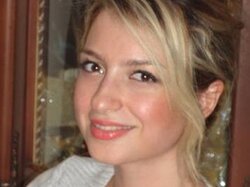
November 2015 to March 2016
Fatemeh Ahmad Kamali's research focus is sustainable management of biosphere reserves in Iran, for which she participated in the master's program "Nature conservation and Landscape ecology" at the University of Greifswald.
She joined the Michael Succow Foundation in 2016 and is responsible for projects on biosphere reserves, world heritage sites, civil society in Iran, Oman and Azerbaijan.
Alisher Shukurov
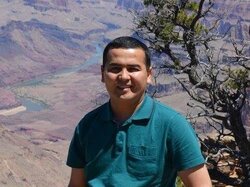
October 2013 to April 2014
Alisher Shukurov advises the Foundation on political and legal issues in Uzbekistan and supports networking in the country. He also completed a Master's degree in "Nature conservation and Landscape ecology" at the University of Greifswald.
Alisher helped set up the FAO country office and was director of the office between 2014 and 2020. Since 2020, he has been the personal advisor to the Uzbek Minister of Agriculture.
Rana Kaviani
Climate change in the Zagros Mountains, Iran
November 2012 to November 2013
Rana Kaviani did her PhD on the comparative study and assessment of biosphere reserves in Iran. She was an employee of the Michael Succow Foundation in projects in Iran and has been an employee of a pharmaceutical company in Greifswald since 2019.
Jahan Annachariyeva
January to June 2010
Jahan Annachariyeva completed a Master's degree in "Nature conservation and Landscape ecology" at the University of Greifswald. She supports the Foundation in technical matters in Turkmenistan. For example, in the preparation of the World Heritage nomination of the Winter Cold Deserts of Turan. She is a staff member in various projects of the Turkmen Ministry of Environment and Resources and an important contact person for the Foundation at the Ministry.
Viktoria Kim
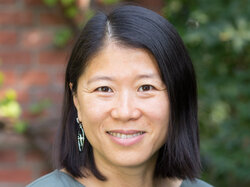
January 2010 until June 2011
Viktoria Kim studied "Nature conservation and Landscape ecology" at the University of Greifswald and works at the Foundation with different working hours. Thanks to her knowledge of the subject, language and country in the post-Soviet region, as well as her contacts in Turkmenistan, she has become an important part of the International Working Group.
Amangul Ovezberdyyeva
December 2007 until October 2008
Amangul Ovezberdyyeva completed a Master's degree in "Nature conservation and Landscape ecology" at the University of Greifswald.
She helped with many projects in conservation organisations such as www.carececo.org or the National Desert Research Institute NIDFF. Since 2016 she is project coordinator of a UNDP project in Turkmenistan "Supporting climate resilient livelihoods in agricultural communities in drought-prone areas of Turkmenistan". Amangul is a staff member in various projects of the Turkmen Ministry of Environment and Resources and an important contact person for the Foundation at the Ministry.
Jamal Hanmedova
December 2007 to October 2008
Jamal Hanmedova completed a Master's degree in "Nature conservation and Landscape ecology" at the University of Greifswald. She is a technical expert in the UNDP/GEF project "Sustainable Cities in Turkmenistan: Integrated Green Urban Development in Ashgabat and Avaza". She is also a staff member in various projects of the Turkmen Ministry of Environment and Resources and an important contact person for the Foundation at the Ministry.
Abdubakir Kushbokov
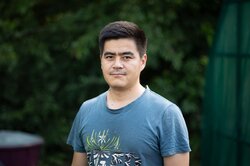
Sustainability of Rangeland Utilisation in the Kyzylkum Desert in Uzbekistan
October 2025 to February 2026
Abdubakir Kushbokov completed his Master’s degree at Samarkand State University in Uzbekistan in 2021. He subsequently participated in the GRO – Land Restoration Training Programme, a fellowship at the Agricultural University of Iceland, in 2022. He is currently pursuing his PhD at the University of Szeged in Hungary, where his research focuses on assessing the soil seed bank and its potential for restoration within the rangelands of the Kyzylkum Desert in Uzbekistan.
As part of the Marion Dönhoff Fellowship Program, his research project is titled “Sustainability of Rangeland Utilisation in the Kyzylkum Desert in Uzbekistan.” He aims to deepen this work by integrating socio-ecological perspectives into the framework of rangeland restoration. His ultimate goal is to develop practical management recommendations that support the restoration of these vital ecosystems.
Supervisor: Rustam Murzakhanov
Mariia Yuskovets
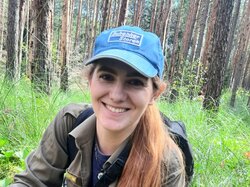
Detailed introduction of the GEST method: an overview of the theoretical and practical aspects of using this method to assess the ecological state of peatlands
May 2025 to September 2025
Mariia Yuskovets is a Ph.D. candidate at the Institute of Ecology of the Carpathians (National Academy of Science of Ukraine), specializing in the vegetation of peatland Syra Pogonia in Polissia. She holds bachelor's and master's degrees in biology and chemistry (Nizhyn Mykola Gogol State University, 2013-2018) and has six years of experience in nature conservation. Her expertise includes peatland vegetation, restoration planning, and nature conservation management. From 2020-2024, Mariia was a researcher in the "Polesia – Wilderness Without Borders" project, monitoring vegetation in the Syra Pogonia peatland (Rivnenskyi Nature Reserve). In 2023, she completed an internship at the Institute of Geography and Spatial Organization Polish Academy of Sciences (IGSO PAS). Her research on Syra Pogonia received an award from the National Academy of Sciences of Ukraine in 2024. Her current fellowship focuses on reviewing the GEST method for greenhouse gas emissions from Ukrainian peatlands. She is also a lead researcher in a biodiversity monitoring project of wetland ecosystems between Canada and Ukraine.
Supervisor: Olga Denyshchyk
Azim Baibagyssov
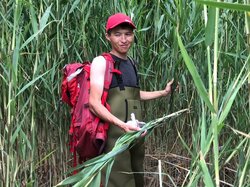
April 2025 to August 2025
Azim Baibagyssov is a biologist from Kazakhstan. For several years, he has been working on his interdisciplinary doctoral thesis, which focuses on the analysis of the socio-ecological system of reed use in the arid regions of Central Asia, particularly in the Syr Darya Delta in the Aral Sea region. Using machine learning methods (especially the random forest approach) in combination with remote sensing data and ground-based biomass samples, he has modeled a spatially explicit yield map for wetlands dominated by Phragmites australis. By quantifying the area and standing biomass of reed beds in the Syr Darya Delta, Kazakhstan, he assessed the biomass resource potential of reed-dominated wetlands and their spatial distribution. Currently, he is investigating reed utilization patterns and their significance for the local population in order to shed light on the economic contribution of reed harvesting to household income in the region.
Within the framework of the Marion Dönhoff Fellowship Program, he aims to delve deeper into the use of reeds as a source of income for the local population and to find out how this use can be reconciled with the protection of the reed beds and their biodiversity.
Supervisor: Rustam Murzakhanov
Viktoriia Pavlovska

Save Peatlands in Ukraine - Communication Strategy, Campaign and Results
October 2024 to February 2025
Viktoriia Pavlovska is a communications specialist from Ukraine with 22 years of experience in the corporate sector. She currently serves as the press secretary for Vodafone Ukraine.
Through her fellowship project, Viktoriia is focused on transforming the perception of peatlands in Ukraine. The primary goal of her project is to increase awareness among key stakeholders — including local communities, entrepreneurs, experts, and the general public — about the value of peatlands. Viktoriia is developing a comprehensive communications strategy to reshape how peatlands are viewed and valued in Ukraine. She is also detailing specific communication tactics and overseeing their implementation.
Her strategy aims to shift the focus from exploiting peatlands for resource extraction to recognizing them as essential areas for sustainable development, climate stability, and even national defense.
Supervisor: Olga Denyshchyk
Aleksandr Pavlenko
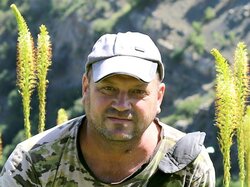
Flora of the Great Balkan Ridge (Turkmenistan)
November 2024 to December 2024
Aleksandr Pavlenko graduated from the Turkmen State University in 1995 and works currently as a zooparasitologist at the Center for Prevention of Especially Dangerous Infections of the Ministry of Health of Turkmenistan. Aleksandr regularly conduct the botanical surveys in the different regions of the Western Turkmenistan. In 2011 - 2015 he worked on the topic “Flora and vegetation of the zone of the new Turkmen lake ‘Altyn asyr’”, learned/researched the floristics and taxonomy, which turned into his hobby. The second big research topic is “Current state of flora of South-West Kopetdag”. In frame of CADI Project Aleksandr participated at design of the website “Digital Herbarium of Turkmenistan”, providing the materials from his personal herbarium collection that consist of more than 10,000 sheets and about 1,800 species, including many topotypes. Aleksandr is an author of the “Atlas of Vascular Plants of Deserts of Turkmenistan”. He found 16 new for Turkmenistan plant species and described 3 new ones for the world.
Supervisor: Rustam Murzakhanov
Dostonjon Bakhriev
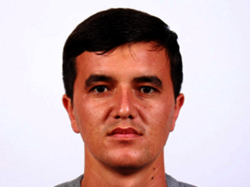
The health indicators of the tugai ecosystem along the middle stream of Zarafshan River in the territory of Samarkand Province
October 2024 to February 2025
Dostonjon Bakhriev studied (bachelor degree) at the Samarkand State University at 2018 to 2022. He finished his master's degree at the Institute of Agrobiotechnologies and Food Security in 2024.
As a Marion Dönhoff Fellow, Dostonjon started studying the Tugai Forest in Zarafshan Valley (Uzbekistan). He focuses on assessing the health indicators and challenges of the Tugai Forest. In order to achieve his aim he is pursuing studies in GIS, Remote Sensing and Environmental Science related to the research area.
Supervisor: Rustam Murzakhanov
Andrii Renda

Assessment of the readiness of local communities in the Volyn region for peatland restoration
June 2023 to November 2023
Andrii Renda is a paleoecologist and geographer with a Master's degree from the National University of Lviv of Ukraine and a PhD on the sustainable use of a peatland in Polesie (Volyn region). He currently works as a hydrogeologist at the Regional Office for Water Resources in the Volyn region. The research within his scholarship is dedicated to assessing the willingness of the local population to restore degraded and drained peatlands.
Supervisor: Olga Denyshchyk
Bulgan Odmaa

Bulgan Odmaa completed her master's degree in geography with a thesis on white-naped cranes at the National University of Mongolia in December 2023. She has been working as a scientist at the NGO Mongolian Bird Conservation Centre (MBCC) since 2021. She has already supported the work on the World Heritage nomination of the Eastern Mongolian Steppes, in particular in the development of geodata and maps.
Due to her accumulated experience in protected area management, World Heritage sites and biosphere reserves, she is now involved in the World Heritage nomination of the Mongolian Gobi as part of the Marion Dönhoff Fellowship. One of her tasks is to publicise the importance of and knowledge about World Heritage sites in Mongolia. To this end, she is developing a social media campaign that she is implementing step by step as part of the scholarship.
Supervisor: Jens Wunderlich
Marcin Górnicki

Amber licensing and extraction in Ukrainian Polesia
August 2023 to January 2024
Marcin Górnicki obtained a master's degree in environmental protection from the Faculty of Biology at the University of Warsaw. His interests include GIS-type software and issues related to climate change and freshwater ecosystems, such as peatlands, to which he devoted attention in his two dissertations. In his Bachelor's thesis, he estimated the amount of carbon present in peat at the studied site by means of fieldwork, and in his Master's thesis, he attempted to estimate the balance of greenhouse gases from organic soils in Polish national parks using the GEST method, which was developed in Greifswald.
Shortly after graduation, he began a fellowship to investigate the granting of concessions and extraction of amber from Ukrainian areas located in Polesia. Marcin aims to document the number of permissions issued, map them, and expose suspected corruption mechanisms in his research. In addition, by analysing Polish literature from the 1930s and 1940s, he will try to gather information on sites that are today at risk of destruction due to planned amber mining. Finally, he will try to provide recommendations for peatland conservation and protection in Ukrainian legislation by examining the peatland-related laws passed in Poland and determining their effectiveness and reasons for success or failure.
Supervisor: Olga Denyshchyk
Oleg Kugaev

Visual communication for promotion universal outstanding value of Eastern Mongolian steppes
December 2022 to January 2023 and August to October 2023
Oleg Kugaev is a wildlife photographer from Siberia. He was among nominees of Sony World Photography Awards in 2019 and got prizes in photo contests National Geographic Russia, Zolotaya cherepakha (Golden turtle) as well as Best of Russia.
His scholarship is about visual communication as a tool for showing value of nature. It is hard to describe properly grazing herds of Mongolian gazelles or gliding Cinereous vulture. People should see and feel them and other animal and plants, for whom the steppes are their home. The home, which humans should conserve and protect.
Supervisor: Nika Malazonia
Liliia Grychulevych
![[Translate to EN:] Liliia Gychulevych (c) Privat [Translate to EN:] Liliia Gychulevych (c) Privat](/fileadmin/_processed_/a/0/csm_Liliia_Grychulevych_Stipendiatin1_7da79ede8d.jpg)
Analysis of the wetlands restoration potential in the Western Bug basin as part of larger efforts to restore small rivers in the Vistula basin within the territory of Ukraine
August 2022 to January 2023
Liliia Grychulevych is a Ukrainian specialist in management of the freshwater resources with a special interest in the small rivers restoration. She has a Degree in Ecology (Odesa State Ecology University), MSc in Governance (Odesa regional institute of governance), and degree in Management and Economics (Odesa State University of Economics).
Ms Grychulevych has been working with State Agency of Water Resources of Ukraine since 2002. From 2017 to 2019, she was Head of the Public Council; from 2019 to 2021 - Head of Basin Directorate of Water Resources of the rivers of the Black Sea and low Danube.
Small rivers restoration activities has sparkled Liliia’s interest in peatlands as integral part of the river basin. Focus area of her research is the Western Bug River basin (sub-basin of the Vistula River) within the territory of Ukraine with a special accent on Krasnosilka River (Lviv oblast). Liliia is planning to (1) analyse the area and select the territories suitable for ecological restoration, (2) prepare recommendations for the local authorities and water management bodies to include the ecological restoration into the strategic development plans, (3) discuss results of the study with the representatives of respective public authorities in Ukraine. Liliia’s study is the first attempt to analyse the river basin to identify the wetlands restoration territories.
Supervisor: Olga Denyshchyk
Uladzimir Karalenak
![[Translate to EN:] Uladzimir Karalenak (c) Privat [Translate to EN:] Uladzimir Karalenak (c) Privat](/fileadmin/_processed_/8/a/csm_20220926_Uladzimir-Stipendiat_ec483fe2ca.jpg)
Wetland Science and Practice of drainage of Belarusian peatlands at the beginning of the 20th century
September 2022 to January 2023
Uladzimir Karalenak specializes in History and Art History. He graduated from the Belarusian State University, where he completed Diploma’s and Master’s degree programmes. During the last 10 years he had been engaged in museum activities, working in Belarus (National Historical and Cultural Museum-Reserve Niasvizh) and in Poland (The National Museum in Warsaw). He was interested in doing research on the relationship between human and nature and published articles on the issue of describing how belarusian marshes lost their original condition and were converted into explored and modernized areas on https://greenbelarus.info/ website.
As part of the scholarship, he will deepen his knowledge about ‘trial mires fields’ – specially selected peatlands which were used for scientific research and experiments at the beginning of XX century. Owned either by the government or by private individuals, ‘trial marshes fields’ were the places where special plows, rollers and tools, which could make it possible for horses to work on the marshes, were tested. Different types of drainage and planting with invasive plants were compared here for the purpose of draining swamps and for agricultural activities and other uses of swamps. The historical reconstruction of the events (experiments and research), which took place in the territories of Belarusian marsches based on “Bolotovedenje” journal (1912-1917) and other papers and documents from this time.
Supervisor: Marina Abramchuk
Natalia Milovanova

Raising public awareness of the important role of peatlands
April to August 2022
Natalia Milovanova graduated with a Bachelor's degree in International Relations from the Russian University of Friendship of Peoples. As the best student of her year, she then worked as a technical translator in South China, Tibet and Moscow. Later, she volunteered in an organisation dedicated to the protection of peatlands and wetlands in Russia and worked in various organisations and companies involved in circular economy and resource conservation. In communicating her concerns, she uses various formats from lectures to face-to-face communication to online courses.
Within the framework of the scholarship, she will look more closely at communication tools and methods in peatland protection and will also be supported by the Greifswald Moor Centrum. The result will be target group-oriented products to inform the public through open lectures, information brochures, creative popular science videos, articles and interviews for the Russian-speaking audience.
Supervisor: Olga Denyshchyk
Alyona Kaptyonkina
![[Translate to EN:] Foto: Privat [Translate to EN:] Foto: Privat](/fileadmin/_processed_/e/8/csm_211119_Alyona_Kaptyonkina_stipendiatin_f7623741c1.jpeg)
Ecological tourism in «Altyn-Emel» national park (Kazakhstan)
November 2021 to March 2022
Alyona Kaptyonkina has a Master's degree in Natural Sciences from Karaganda State University (Kazakhstan) and a Bachelor's degree in Education in Biology (Kazakhstan). She took part in a 5-month (2018-2019) exchange program with Babes-Bolyai University (Romania) in the Public Health department.
During her studies, Alyona liked to do volunteer work, learn new information, enrich her background, to obtain new experience and knowledge. Since 2016, she has been a member of the Association for the Conservation of Biodiversity of Kazakhstan (ACBK). Since 2019, Alyona is a Council member of the ACBK. For almost five years, she has been actively cooperating with the ACBK in winter and autumn bird monitoring. Moreover, Alyona was an assistant on birdwatching tours for foreigners.
Alyona has been working as a biology teacher at a state school and as a junior researcher in different scientific projects in Kazakhstan.
During her 5-month Marion Dönhoff grant at the Michael Succow Foundation, Alyona will explore sustainable ways to develop ecological tourism in protected areas in Kazakhstan. Her goal is to learn (discover) the European experience of ecotourism organizations and make a plan for ecotourism in Kazakhstan. Also, she will prepare small handbooks and different booklets for historians, birdwatchers, and ordinary tourists
Supervisor: Rustam Murzakhanov and Dilfuza Yuldasheva
Artur Komar
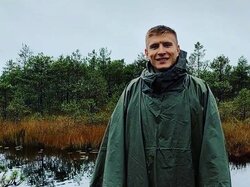
Assessment of peatland rewetting for reduction of GHGs and nutrients emissions - a case study of Vostrava peatland, Belarus.
October 2021 to March 2022
Artur Komar has graduated from the Belarusian State Technological University, where he studied forestry. His master thesis was connected with research of influence of road to the forests using GIS. Today, Artur is a PHD students at Institute of experimental botany of National academy of sciences of Belarus. In his dissertation, he investigates the influence of large drainage reclamation on pine stands growing on the raised bogs in conditions of destruction of drainage systems. Artur is involved in the research of peatlands rewetting in Belarus. His scientific interests are geobotany and remote sensor data.
As a Marion Dönhoff fellow, he investigates dynamic of vegetation and groundwater table of rewetted extracted peatland "Vostrava", Belarus. Important subject of research is to calculate GHGs and nutrients emissions.
Supervisor: Dr. Wendelin Wichtmann und Marina Abramchuk
Matluba Mustaeva

How to Involve the Local Population into Protection of Desert Ecosystems in the Fergana Valley
May to September 2021
“As a freelance journalist, I do believe I could bring my expertise and another dimension into highlighting environmental problems in Uzbekistan. Marion Doenhoff Fellowship would allow me to learn more international experience about nature conservation and would help me to promote a deep interest in finding a sustainable way of developing further back in my country."
Matluba Mustaeva has a bachelor's degree from the Uzbek State University of World Languages. She is a freelance journalist from Central Asia based in Berlin. A graduate of the Faculty of International Journalism (Tashkent), she has diverse experience of working in international media. She directed the sports news agency, worked in the field of online journalism and social media. As a mother of three children and advocate of sustainable lifestyle, Matluba decided to pay attention to environmental issues in her professional life.
During the five months of the Marion Doenhoff Fellowship, Matluba will explore the technical and practical possibility of attracting the attention of social media users in Uzbekistan to nature conservation issues. Of particular interest for Matluba is the localization of environmental content into the Uzbek language, and the popularization of nature conservation topics in the Fergana Valley among young people. The Fergana Valley is one of the most densely populated areas in Uzbekistan and, is therefore being constantly developed for agriculture. It used to contain a big sandy environment called Akkum, but as a result of active agricultural expansion today it has turned into 13 separated sandy islands.
Supervisor: Rustam Murzakhanov and Dilfuza Yuldasheva
Aleksandrs Kalamashnikovs
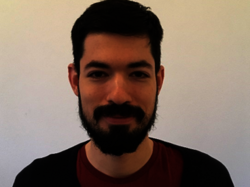
The Baltic potential for Heat or Energy plants using graminoid biomass from paludicultures
November 2020 to April 2021
Aleksandrs Kalamashnikovs holds a bachelor's and master's degree in environmental sciences from Riga University of Technology. In addition, he participated in a six-month exchange program with the Instituto Superior de Engenharia do Porto in the Master's program sustainable energies. During his academic career, Aleksandrs also gained 3 years of work and internship experience in the energy sector. His fields of study included renewable energy resources, heating systems, sustainable development, ecology and environmental protection. Previously, he worked as a heat technician and electronics technician. Aleksandrs is one of the founders of Fridays For Future Latvia.
During his 5-month Marion Dönhoff Fellowship at the Michael Succow Foundation, Aleksandr will conduct research on paludiculture biomass. The intention is to determine the technical and economic uses of biomass grown on local peatlands for the purpose of heat and power generation. The main objectives of the research are: analysis of the current situation of biomass production in the Baltic States; Analysis of the properties of paludiculture biomass fuel; Identification of possible locations where paludiculture plants could be grown; analysis of the most viable options for harvesting, processing and burning biomass; Determination of the preliminary costs for the establishment of paludiculture biomass use for heating and/or energy production.
Supervisor: Andreas Haberl
Iryna Holovko
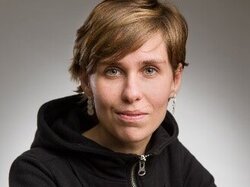
Ecosystem-based adaptation (ÖBA) to climate change in protected areas of Ukraine. Policy recommendations on the application of the ÖBA approach in Ukraine.
May 2020 to October 2020
Iryna Holovko is co-founder and board member of Ecoaction, one of Ukraine's leading environmental NGOs, which deals with climate protection and energy policy. Iryna holds a master's degree in environmental studies from the Ukrainian University "Kyiv-Mohyla Academy" and is currently studying Public Policy at the Hertie School of Governance (Berlin). Prior to that, she worked as a national campaigner for Ukraine at CEE Bankwatch Network from 2007 to 2017 and as an expert on energy policy at the NGO National Ecological Center of Ukraine. From 2017 to the end of 2019, Iryna was head of energy campaigns at Ecoaction and, among other things, responsible for the development of a renewable energy campaign, as part of a project with BUND/Friends of the Earth Germany, to strengthen civil society in the implementation of national climate policy. During her 5-month fellowship, Iryna worked with the EbA-Ukraine project team on the development of a policy proposal for the integration of principles of ecosystem-based adaptation to climate change into Ukrainian environmental legislation.
Supervisor: Ina Rohmann
Anna Vardanyan
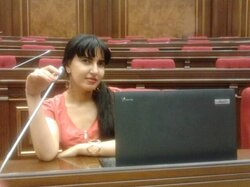
Principal ecological threats of the mining industry in Armenia and its political and legal background
February bis June 2020
Anna Vardanyan is a journalist and political analyst from Armenia. She works at the Armenian news agency "Hayeli/ Mirror" and in the Press Club, which is one of the leading online news channels in Armenia. In addition, it is also active in the field of promoting civil society by carrying out several educational and research projects.
As part of the Marion Dönhoff Fellowship, Anna conducted independent research on the alarming ecological problem in Armenia, the mining industry. She identified the main ecological threats posed by them and their political background. Through her work, she aims to raise public and state awareness of all threats, offer a critical perspective on the issue and thus make the new risks of environmental disasters in her country and the entire region accessible. During the period of her scholarship, she researched literature and media references, studied the international environmental conventions and declarations in the field of environmental protection, met with representatives of civil society institutions, environmentalists and ecologists for exchange and familiarized herself with their agenda. Her written research is based on interviews with relevant experts in the field.
Irina Grigoryeva
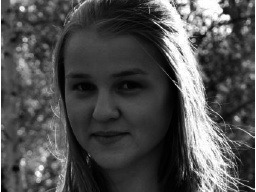
Ecotourism in Mangystau. A survey of the European consumer
December 2019 to September 2020
Irina Grigoryeva studied biologus (M.Sc. ) from Kazakhstan. In her master's thesis, she dealt with the steppe marmot and its population in the areas of Akmola and Karaganda in Kazakhstan. Already during her studies, she worked for the Kazakh Organization for the Protection of Biodiversity (NGO ACBK), where she is now employed and active in various projects. ACBK is committed to the protection and sustainable use of biodiversity in Kazakhstan and works in the field of monitoring, public relations and support for local nature conservation groups. She will now begin her scholarship at the Succow Foundation at the end of 2019.
She is involved in the development of ecotourism offers in the Ustyurt Protected Area in Kazakhstan. Before her stay in Greifswald, she already carried out investigations and discussions in the target area, on the basis of which she now develops recommendations and suggestions for tourist routes, further tourist infrastructure and information and communication material in her scholarship. In doing so, she would like to incorporate the experience and recommendations of German experts and organizations.
Supervisor: Rustam Murzakhanov
Dinara Adilova
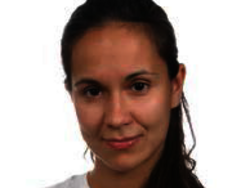
Adaptation of European sustainable tourism experience for Lower Amudarynski Biosphere Reserve in Uzbekistan
November 2019 to January 2020
Dinara Adilova from Uzbekistan studied computer science and biotechnology in Tashkent and has been working as an independent web and print designer in the field of nature conservation and environmental education since 2008. In addition, she has been involved for many years as a volunteer and IT specialist in various projects for biodiversity conservation and sustainable development in Central Asia. So she designed various websites such as e.B. www.bird.uz or www.pistachio.uz.
In her 3-month Marion Dönhoff Fellowship, she dedicates herself to the Tugaifloodplain forests in the Lower Amudarya Biosphere Reserve. It develops proposals and recommendations for tourist communication material (e.g. ecosystem guide) as well as concepts for visitor guidance in the protected area (routes, viewpoints, etc.). In consultation with Hermann Hatzfeld, Dina completed only 2 of the 3 scholarship months in Greifswald in order to be able to work another month in the target area of her project. She used her stay in Greifswald for conceptual work and discussions and research with German experts and organizations in the field of ecotourism.
Supervisor: Rustam Murzakhanov
Andrei Abramchuk
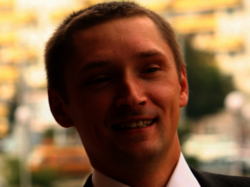
Identification and protection of primary forests in the Belarusian Polesyse
February to June 2019
Andrei Abramchuk studied geography and agriculture in Belarus Poland. He has already worked as a scientist in the Białowieża Protected Area, at the Agroecological Institute of the National Academy of Sciences of Belarus and as a specialist in the biosphere reserve "Pribuzhskoye Polesye" ("Western Polesye"). In the biosphere reserve, he worked as a research coordinator and expert in the field of nature conservation and environmental education. Andrei is a member of the Central Council of the largest Belarusian environmental protection organization APB-BirdLife Belarus, Chairman of the Advisory Committee on the Environment and Chairman of the Forest Working Group of APB-BirdLife Belarus.
Andrei's main areas of interest are theoretical and practical questions of nature conservation, especially in relation to the forest ecosystem. As part of his Marion Dönhoff Fellowship, he worked on the development and application of a method for the identification of primary forests for the Belarusian "Polesye". To this end, he also carried out field work on the test of the methodology and pilot studies in several areas. Based on the analysis of existing environmental practices in Belarus, Andrei also developed proposals for possible mechanisms for the protection of primary forests in Belarus. Due to the extraordinary motivation and outstanding commitment of Andrei, he was awarded the scholarship despite a lack of English language skills. He wrote his final report in Russian.
Supervisor: Uli Gräbener
Danil Utyupin
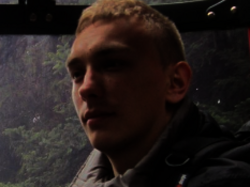
Conflicts between nature conservation and the economic activity of local actors using the example of the island of Rügen
August to December 2018
Topic:
Conflicts between nature conservation and the economic activity of local actors using the example of the island of Rügen
Danil Utyupin is a journalist from Kazakhstan. After studying history at the national Al-Farabi University in Almaty, he completed further training in journalism and worked in various media. He is currently focusing on his main topic of environmental protection at the Kazakh newspaper "Liter". During the Marion Dönhoff Fellowship in Germany, he investigates conflicts between nature conservation and the economic activity of local actors using the example of the island of Rügen. He conducted interviews with selected actors from the region and evaluated the media coverage on this topic.
By exploring this field of tension and getting to know approaches and instruments in nature conservation in Germany, he can develop ideas for possible solution models for his home country Kazakhstan and incorporate them into his publications there. In addition, Danil was able to familiarize himself with the (environmental) media landscape of Germany, published an article in the Greifswald student magazine "moritz" and attended lectures of the landscape ecology and nature conservation course at the University of Greifswald.
Supervisor: Sophie Hirschelmann, Rustam Murzakhanov
Tsogt Erdene
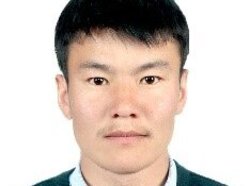
Sustainable management of peatlands and permafrost soils using the example of the KhurkhValley
April to August 2018
Tsogt Erdene studied geography at the Mongolian National University in Ulanbataar. Since 2014, he has been working as a scientist at the National Academy of Sciences of Mongolia in the Department of Permafrost. There he participated in research projects for the mapping, investigation and modelling of peatlands and permafrost and their interactions. During his Dönhoff Fellowhips, he was involved in the development of a concept for a project for the sustainable management of peatlands and permafrost soils using the example of the KhurkhValley.
His main work in the Fellowship was to write a generally understandable report in Mongolian language with a detailed summary on the current state of research and previous research results on this topic in order to better communicate the topic and the challenges with peatlands and permafrost in the broad society. During his stay in Greifswald, he was able to expand his knowledge in the field of moor ecology through the exchange with experts from the Greifswald Moor Centrum.
Supervisor: Jan Peters
Elena Leonovich
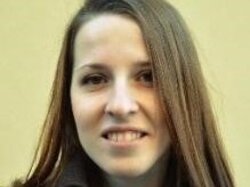
The problem of greenhouse gas emissions from peatlands
July to November 2017
Elena Leonovich graduated in 2015 from the Faculty of Mining and Environmental Engineering of the Belarusian State University. She works at the National Academy of Sciences of Belarus as a junior researcher in the biogeochemical and agroecological laboratory at the Institute of Nature Management. As a Marion Dönhoff Fellow at the Michael Succow Foundation, she analyses the balance of greenhouse gases from peatlands.
Supervisor: Andreas Haberl
Nadzeya Liashchynskaya
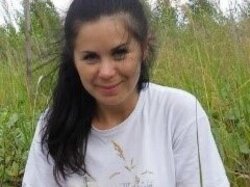
August to December 2017
Nadzeya Liashchynskaya studied biology at the Belarusian State University. In 2009, she began working for the BMU/KfW Climate & Biodiversity project as a vegetation & monitoring specialist. Through the project work, she deepened her interest in the ecology of the moors. After eight years of experience in the renaturation of peatlands, she is now working as a Marion Dönhoff Fellow at the Michael Succow Foundation on the conclusion of the monitoring report on rewetted peatlands in Belarus, which serves as preparation for the accreditation of carbon credits according to the VCS/CCBA method. The report will be published within the VCS/CCBA program and will be available at www.v-c-s.org. It will also support the completion of the first VCS/CCBA project document in Belarus.
Supervisor: Andreas Haberl
Keti Jibladze
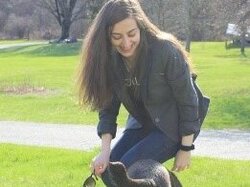
Learning examples of participation and awareness-raising in German UNESCO biosphere reserves for biosphere reserve development in Georgia
January to Mai 2017
Keti Jibladze studied journalism at Tbilisi State University before starting working at the Regional Environmental Centre for the Caucasus (REC Caucasus) in 2010, helping the organization solve regional environmental problems of the countries of the South Caucasus. During her studies, Keti developed a deep professional interest in environmental protection, which shaped her later career. The significant deterioration of the environment in Georgia has aroused their interest even more.
Deterioration includes deforestation, water scarcity, soil degradation and pollution. These are all by-products of rapid economic growth and industrialization. This motivated her to put all her efforts into the community for the protection of the environment in which she lives. After six years of work experience at rec Caucasus, Keti became a Marion Dönhoff Fellow and worked in the field of identifying bottlenecks and obstacles to the implementation of the biosphere reserve model in Georgia (Kakheti region). In addition, Keti will develop specific recommendations for the realization of the biosphere reserve concept, followed by familiarization with the German experience, field investigation and interviews with Succow Foundation experts, representatives of the operational biosphere reserve in Germany and other relevant stakeholders.
Supervisor: Sophie Hirschelmann
Marina Abramchuk
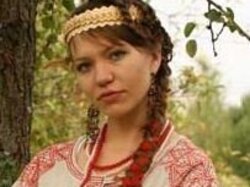
December 2016, January to Mai 2017
Marina Abramchuk completed her master's degree in environmental management at the University of Warsaw. In her dissertation, she investigated the influence of large caterpillar mowers on the preservation of habitats for the sedge warbler, on vegetation structure and the plant diversity of peatlands. Marina has been a member of APB-Birdlife Belarus for twelve years. As a Marion Dönhoff fellow, she pursued her research on the management of peatlands as a habitat for globally endangered sedge warblers in Germany and Belarus and investigated possible conflicts in nature conservation.
Supervisor: Jan Peters
Dilfuza Yudasheva
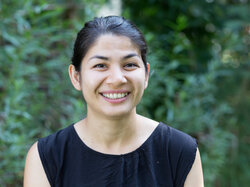
Integrating Education for Sustainable Development in the Lower Amudarya State Biosphere Reserve
July to December 2016
Dilfuza studies Global Change Management in the Master's program at the HNE Eberswalde. Her Marion Dönhoff Fellowship was embedded in the ongoing application of the MARISCO method (Adaptive Management of vulnerability and Risk at Conservation sites) in the Tugai habitats at the lower reaches of the Amudarya. In addition, she focused on the communication and environmental education components in the Uzbek Lower Amudarya Biosphere Reserve together with the partner organization KRASS (Khorezm Rural Advisory Support Service).
Supervisor: Jens Wunderlich
Davlat Rasulov
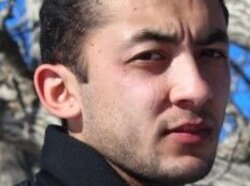
Qualitative and quantitative assessment of rangeland restoration extent in sandy deserts of Uzbekistan
September and November 2016
Davlat Rasulov pursued his master thesis "Qualitative and quantitative assessment of rangeland restoration extent in sandy deserts of Uzbekistan (case study in Surkhandarya province)" at the Faculty of Biology of the University of Samarkand/Uzbekistan.
As a Marion Dönhoff Fellow, he pursued studies in geographic information systems, remote sensing and statistical analyses related to the project area.
Supervisor: Jens Wunderlich
Oleg Savitsky
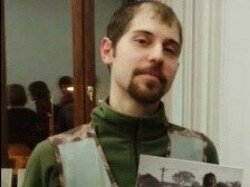
Towards the Energy Transition in Ukraine - Finding pathways to energy independence and carbon-neutral power sector
March to August 2016
Oleg is a climate and energy policy expert and works with international environmental networks such as Climate Action Network and CEE Bankwatch Network. Oleg graduated with a master's degree in electronic engineering from Kyiv Polytechnic Institute. He is an active member of the Ukrainian environmental group National ecological center of Ukraine (NECU) and co-founder of the Ukrainian Youth Climate Association (UYCA).
He focused on climate action and pollution reduction through the sale of fossil fuels, decarbonisation of the energy sector and transition to renewable energy sources. As a Marion Dönhoff Fellow, Oleg analyzed the energetic potential of low moor biomass in Ukraine as part of his overarching topic of a possible energy transition in Ukraine.
Supervisor: Uli Gräbener, Dr. Wendelin Wichtmann
Anatoliy Smaliychuk
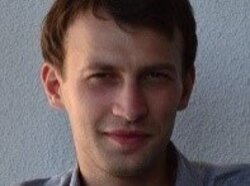
March to August 2016
Anatoliy is an assistant professor at the Geography Department Ivan Franko University of Lviv in Ukraine. Part of his doctoral thesis are recent land use changes in the Ukrainian part of the Carpathians, which are related to natural landscapes, infrastructure facilities and ecological networks. His research interests include the mapping and analysis of land use changes, statistical modelling, the application of GIS and remote sensing in landscape ecology.
During his stay at the Michael Succow Foundation with various research groups, Anatolyi expanded his expertise in GIS application to other research fields, such as the management of biosphere reserves or the possible energetic use of low moor biomass in Ukraine.
Supervisor: Uli Gräbener, Andreas Haberl
Rustam Murzakhanov
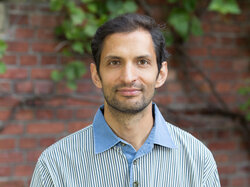
Planning of a New Protected Area in the South of Karakalpak Ustyurt
February to July 2016
Rustam Murzakhanov got BSc and MSc at the Technical University of Tashkent, Uzbekistan. He worked since 2001 in a national NGO and was involved in a number of regional and international initiatives, like Central Asian Youth Environmental Network. From 2010 to 2012 he studied "International Landscape Ecology and Nature Conservation" at the University of Greifswald and obtained his master's degree. Since January 2013, Rustam Murzakhanov has supported the Michael Succow Foundation in Uzbekistan.
Rustam Murzakhanov dedicated his residency as a fellow to researching different aspects of nature conservation of the Ustyurt Plateau in the western part of Uzbekistan.
Supervisor: Jens Wunderlich
Parham Dibadj
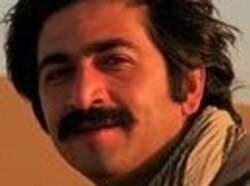
Wildlife photography in Iran
November 2016
Parham Dibadj graduated as Master of Biodiversity Engineering from Tehran Azad University. For the past fifteen years, he has been involved as an activist and filmmaker for the protection of wildlife in Iran. Parham founded the NGO Echo of Persia Wildlife Foundation, produced over ten wildlife documentaries and recently received the "Protector of the Land" award from the Iranian government.
As a Fellow of the Michael Succow Foundation, Parham Dibadj developed contributions to wildlife conservation in the Foundation's future conservation commitment in Iran.
Supervisor: Sebastian Schmidt
Fatameh Ahmadi Kamali
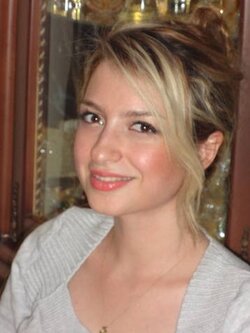
Comparison of Biosphere reserves governance and management in Iran and Germany
March 2015 to March 2016
Fatemeh is an interdisciplinary researcher who has dedicated her work to the exploration, management and conservation of nature. Her professional national and international experience includes cross-cultural work with indigenous inhabitants and traditional communities, particularly in Iran. She is an active contributor to the Iranian environmental organization CENESTA. For the past four years, she has been working on sustainable development and reconciling the needs of residents and the protection of nature in potential protected areas.
Supervisor: Sebastian Schmidt
Elshan Nuriyev
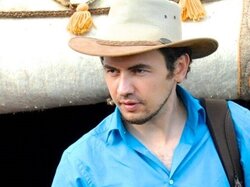
Potential zones for biosphere reserves in the Republic of Azerbaijan and their possible impact on sustainable development process
February to March 2015; May to July 2015
Elshan Nuriyev is a post-graduate at the Institute of Soils and Agriculture of the Azerbaijan State Academy of Sciences on sustainable tourism in national parks. His focus is on the analysis of international and primarily German practice in and with biosphere reserves.Elshan Nuriyev is also active in civil society social networks and founder of the environmental organization
"Nature Friends". This was able to mobilize enthusiastic bicycle friends as well as environmentalists in Azerbaijan and thus increase the awareness and responsibility of people for their environment with numerous actions.
Supervisor: Sebastian Schmidt
Alisher Shablodov
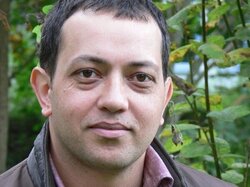
Incomplete reforms and institutional bricolage in community-based governance of mountain irrigation systems in Tajikistan: A case study in the Pamirs
October to December 2014
As a research associate at the Mountain Societies Research Institute of the University of Central Asia, Alisher Shablodov is currently completing his PhD at the Center for Development and Environment at the University of Bern/Switzerland. Since his master's degree in 'Built Environment' with a focus on land management at the Royal Institute of Technology (KTH) in Sweden, he has been interested in the distribution of natural resources with a special focus on land and water.
During the Marion Dönhoff Fellowship, Alisher worked on the question of how to assess the potentials and limits of jointly acting institutions for sustainable water management in the montane irrigation system of the Tajik Pamir.
Supervisor: Sebastian Schmidt
Agnesa Karapetyan
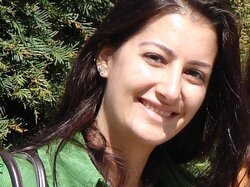
Private protected areas in post-Soviet countries: Comparative Study of an Armenian model
January 2015 to May 2015
Agnesa Karapetyan works as a project manager of the Armenian Foundation for the Preservation of Wildlife and Cultural Assets in Yerevan. In the internationally funded foundation, she supervises projects for regional development, water management, renewable energy, sustainable management of biodiversity, nature conservation and environmental education. Agnesa Karapetyan holds a Master's degree in European Studies from the University of Wuppertal and a Master's degree in "Conflict and Development" from the University of Basel. Her research focused on two areas: regional development and nature conservation.
Supervisor: Sebastian Schmidt
Svetlana Tsymlyakova
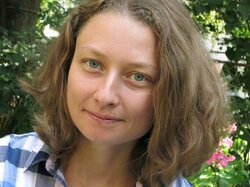
Carbon certificates from the reduction of greenhouse gas emissions through re-wetlands of drained peatlands in the Tver region
July to September 2014
Svetlana Tsymlyakova is a geoengineer and lecturer with a focus on peatlands at tver University of Technology. During her Marion Dönhoff Fellowship, she explored ways to generate carbon certificates from the reduction of greenhouse gas emissions through re-weting of drained bogs in the Tver region.
She attended several conferences, training courses and seminars on the re-weting and sustainable use of peatlands in Germany as part of the project "Re-weting of peatlands in Russia – prevention of fires and mitigation of climate change". Participation in these events aroused their interest in deepening their knowledge on reducing greenhouse gas emissions from peatlands through re-weting and their integration into the voluntary carbon market.
Supervisorin: Susanne Bärisch
Stacey Wilenkin
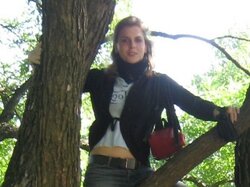
Implementation of Response Measures for Economies in Transition and Mountain-Landlocked Developing Countries
September 2014 bis Februar 2015
Stacey Wilenkin hat ihre postgraduellen Studien in Klimapolitik und Nachhaltigkeitswissenschaft abgeschlossen, und war zuvor als Regionalkoordinatorin für Netzwerke der Jugend und Frauen aktiv. Ihre Arbeit umfasste Projekte in wissenschaftlicher Entwicklung, ländlichen Expeditionen, sowie Bewusstseinsbildung in Themen der Klimaanpassung und Nachhaltigkeit.
Für ihr Fellowship fokussierte sie sich auf eine Analyse der Umsetzung von Reaktionsmaßnahmen der Klimaanpassung, insbesondere bezüglich der sogenannten Reformländer und Berg-Binnenentwicklungsländer.
Supervisor: Jan Peters
Komila Nabiyeva
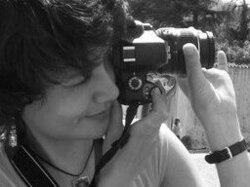
Renewable Energy and Energy Efficiency in Central Asia: Prospects for German Engagement
April to August 2014
Komila Nabiyeva holds a Master's degree in European Studies from the Jagiellonian University in Krakow/Poland. Today she works as a freelance journalist with a focus on environmental, climate and development policy in Eastern Europe and Central Asia. During the Marion Dönhoff Fellowship, she researched the potential and perspectives of renewable energies in Central Asia. There, more than 300 sunny days per year, together with a favourable geographical location, actually offer favourable conditions for the development of renewable energy sources.
However, the necessary political framework conditions for an investment offensive have so far been lacking. Komila Nabiyeva analysed, among other things, the role played by Germany as an energy transition pioneer in the exchange with Central Asia and how the Federal Government can help shape the Central Asian energy transition through appropriate development cooperation.
Supervisor: Jan Peters
Aiman Imentai

The review of fauna and flora and its relation to water resources in the Ile-Balkhash Basin
March to July 2014
The anthropogenic influence on aquatic ecosystems is the focus of the work of the Kazakh hydrologist Aiman Imentai. The young scientist from the Zoological Institute of the National University of Kazakhstan has been conducting research on this since 2009 and is also involved in the designation of Kazakh biosphere reserves for the UNESCO "Man and Biosphere" programme. From October 2012 to February 2013, Aiman Imentai was able to complete a Master's degree at the University of Greifswald as part of the CABNET university cooperation programme.
Through the Marion Dönhoff Fellowship, she was able to use the contacts made and further expand her focus on content. Aiman Imentai examined the water management of the Ili Balkash Basin, taking into account recent agreements on transboundary tributaries between China and Kazakhstan. With 18,000 km2, the Balchasch is the largest inland lake in Central Asia and lies in a drainless basin. Due to the increasing water withdrawal from the tributaries, the lake shrinks.
Supervisor: Dr. Niels Thevs
Elina Aibova
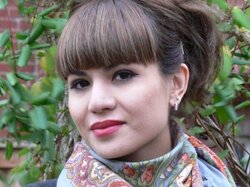
First Steps Towards a Climate Protection Concept for the City of Almaty
Dezember 2013 bis Februar 2014
After completing her studies in Almaty and Mainz, the economist Elina Aibova from Kazakhstan now works as head of the marketing department of the German-Kazakh University in Almaty. Her previous work focuses on project management (business development and marketing), change management, corporate financing and human resources management. After initial ideas for the more climate-friendly orientation of the university emerged, Elina Aibova decided to take a closer look at this topic both at the university level and at the level of the city of Almaty. With the project "First steps towards a climate protection concept for the city of Almaty", she showed possibilities for reducing CO2emissions for the city of Almaty.
On the other hand, it created a concept to increase the perception and sense of responsibility of the inhabitants of Almaty for the topic of climate protection. Examples from Germany on climate protection concepts of various cities as well as concrete actions, such as the car-free day, gave her impulses and further ideas for working on the topic.
Supervisor: Susanne Bärisch
Publications Eva-Kleinn-Scholarship
Development of recommendations for sustainable management of the Ural saiga antelope population to reduce the human-wildlife conflict in Kazakhstan
Aibat Muzbay (2024)
Combination of observational and functional trait-based approaches in developing a polyculture design tool
Pavlo Ardanov, Annette Piorr, Alexandra Doernberg, Sonja Brodt, Jennifer B. Lauruol, Iryna Kazakova, Valentyna Movchan & Lucas A. Garibaldi (2023)
Publications Marion Dönhoff Scholarship
For each grant, a publication in the series "Marion Dönhoff Working Paper" is sought. However, this is not the appropriate format in all cases. With the focus on journalistic work and communication with and between different target groups, other formats of publication are also given preference. Thus articles, journalistic contributions in online and print, policy advisory papers, brochures or other communication media appear.
Flora of the Great Balkan Ridge (Turkmenistan)
Aleksandr Pavlenko, 2025
Save Peatlands in Ukraine - Communication Strategy, Campaign and Results
Viktoriia Pavlovska, February 2025
Amber licensing and extraction in Ukrainian Polesia
Marcin Górnicki, June 2024
Ecological tourism in “Altyn-Emel” National park
Kaptyonkina Alyona, April 2022
How to Involve the Local Population into Protection of Desert Ecosystems in the Fergana Valley
Matluba Mustaeva, January 2022
The Baltic potential for Heat or Energy plants using graminoid biomass from paludicultures
Aleksandrs Kalamašņikovs, May 2021
Principal ecological threats of the mining industry in Armenia and its political and legal background
Anna Vardanyan, July 2020
Adaptation of European sustainable tourism experience for Lower Amudarya Biosphere Reserve in Uzbekistan - Development of audio guide and handout materials
Dinara Adilova, January 2020
Ecotourism in Mangystau. A survey of the European consumer
Irina Grigoryeva, April 2020
Konflikte zwischen Naturschutz und Wirtschaftstätigkeiten der Bevölkerung am Beispiel der Insel Rügen und Relevanz für Kasachstan
Danil Utyupin, December 2018
The problem of greenhouse gas emissions from peatlands
Elena Leonovich, November 2017
Qualitative and quantitative assessment of rangeland restoration extent in sandy deserts of Uzbekistan
Davlat Rasulov, 2017
Integrating Education for Sustainable Development in the Lower Amudarya State Biosphere Reserve
Dilfuza Yuldasheva, December 2016
Incomplete reforms and institutional bricolage in community-based governance of mountain irrigation systems in Tajikistan: A case study in the Pamirs
Alisher Shabdolov, 2016
Towards the Energy transition in Ukraine - Finding pathways to energy independence and carbon-neutral power sector
Oleg Savitsky, July 2016
Renewable Energy and Energy Efficiency in Central Asia: Prospects for German Engagement
Komila Nabiyeva, May 2015
The review of fauna and flora and its relation to water resources in the Ile-Balkhash Basin
Aiman Imentai, Juli 2014

